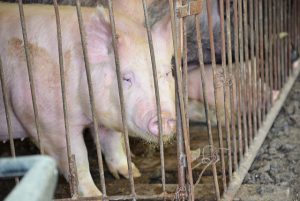Organic pig production reduces antibiotic-resistant bacteria
 Photo credit: United Soybean Board
Photo credit: United Soybean Board
A recent study published in the scientific journal Frontiers in Microbiology has found that pigs raised on organic farms have significantly fewer strains of antibiotic-resistant Campylobacter bacteria than pigs raised on conventional farms. Campylobacter is a bacteria known to jump from livestock, particularly from poultry and pigs, to infect humans. Researchers took fecal or colon samples from organic and conventional pigs in France and Sweden and tested them for Campylobacter bacteria as well as antibiotic-resistant strains. Pigs were tested from 50 farms in France and 54 farms in Sweden. Unsurprisingly, they found that there was no difference in the amount of Campylobacter bacteria from organic or conventional farms. Naturally associated with pigs, Campylobacter was expected to be found on all farms. However, the study results did show that organic samples from France had significantly fewer antibiotic-resistant strains than samples from conventional farms. Meanwhile, pigs raised in Sweden exhibited no difference in the prevalence of antibiotic-resistant Campylobacter. This result may have been because different species of Campylobacter bacteria are found in Sweden and France, and biological variation among these species may equate to differences in how antibiotic resistance develops and persists in the bacteria.


